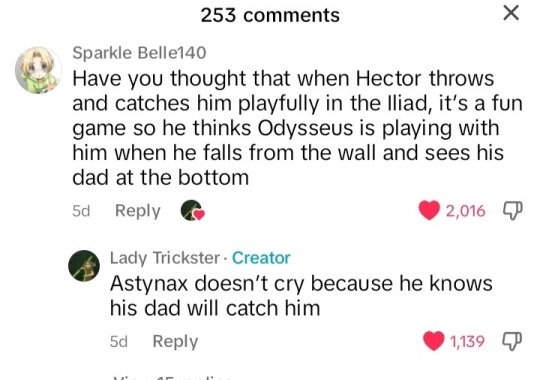Text
Yes Troy (2004) is shit,, but they were so real for having Hector hug Helen



711 notes
·
View notes
Text
don't think about Hector holding Scamandrius in the Underworld don't think about Hector holding Scamandrius while waiting decades for Andromache in the Underworld don't think about Hector rocking and cuddling Scamandrius in his arms while waiting for Andromache in the Underworld don't think abo-
Edit: check the reblogs for a surprise
280 notes
·
View notes
Text
I neither love nor hate any Iliad character or basically any Epic Cycle person. They are all so complex and human, it’s make me wonder what happened to characters like that.
Yes, Agamemnon is who I will time and time again blame everything for, but he’s so tragic. Killing a daughter because it isn’t about choosing family over a war, it’s about choosing family over family. Let her live and go home with his wife or kill her and stand beside his younger brother like he has always and will always do.
Achilles, the most selfish man to set foot on Troy, but only when it mattered. When he finally realised his worth was more than dying for a course he didn’t believe in, it was too late. He was angry and mourning and cruel and kind and everything a hero should be and shouldn’t.
The man who gets a whole book for himself, Odysseus. Who did everything he could to stay and then get home. Who lost his moral compass to get there. Who never lost sight of what he wanted even when he lost sight of who he was. A man who wanted nothing more than to taste the lips of his wife rather than glory.
Hector, the picture perfect father and husband. The Son of Troy, their golden prince. The same man who comes home everyday stained with Greek blood. The man who needs to take off his helmet for his son to see he isn’t really a monster, he is just a victim to war. The man who taunted men as they died. The man who laughed with his wife as they loved their son as much as a war would let them.
Helen, the victim and hunter. The women who started it all. The one who left than regretted it or didn’t leave at all. The women who ran away and was responsible for so much damage which was beyond her control. Helen a women who is so complex, even in the Iliad, no one can seem to agree what her motive for leaving in the first place.
I could go on and on about these characters and more (probably not Little Ajax I don’t really care for him). Homer is the personification of “You can’t outdo the doer”
619 notes
·
View notes
Text
you know What’s really sad? Hector of Troy will never be king. Hector, break of horses, Hector the Just, crown prince and heir, Hector, who loved his family more than his life, Hector, who dreamed of his son becoming greater than he, a thing very few heroes wished for, Hector, fairer than any of the Greeks, Hector.
Hector will never be king, and his son will never become greater than he, and his wife cannot live a life of comfortability.
294 notes
·
View notes
Text
Do you ever think about how both Odysseus and Hector were yanked into the war by their relations, how they both have small children they must leave to fight, how they both were so gentle with them and are so vicious in battle. The hands that rock the infant are the hands bathed in the blood of enemies, dripping red but comforting notheless. And do you ever think about how Odysseus couldn't see his son grow, day by day, but will, ultimately see him as a man, and how Hector has seen his own son grow day by day but will no more, a dead child? Why does this father and this son live? Why doesn't this one and the other?
Hector and Skamadrios have been reunited in death, at peace, finally, and Odysseus and Telemachus have been reunited in life, but will still have to spill blood to be at peace and idk where I was going with this but it's making me feral
670 notes
·
View notes
Text
Odysseus watching Achilles absolutely mutilate Hector's corpse

7K notes
·
View notes
Text
Congratulations to Paris of Troy for being the original dumb blonde
32 notes
·
View notes
Text
The Varieties of Chinese Mermaids
In the modern day, most people will think of the pearl-crying Jiaoren. However JIAOREN IS NOT THE PERFECT EQUIVALENT OF THE MERMAID in pre-modern folklore.
Chinese mermaids come in multiple types. Most of them can be found in the Chronicle of the Mountains and the Seas (Shan Hai Jing/山海經). Others can be found in the In Search of the Supernatural (Sou Shen Ji/搜神記) or Extensive Records of the Taiping Era (Taiping Guangji/太平廣記).
YUFU/MER-WIFE (魚婦): Zhuanxu was a god-emperor in legendary times, whose accomplishments included sending two of his sons to complete the separation of Heaven and Earth. When he died, fish ate his corpse, becoming half fish and half human women. They live in the Great Wilderness toward the west of China. They combine traits of humans, fish, and snakes. The Classic of Mountains and the Seas states: "There is a fish half-withered, it is Zhuanxu that died and then revived; when the winds blow northward, the sky whips up great geysers, snakes transform into fish, and those are mer-wives."
LINGYU/HILL FISH (陵魚,鯪魚): The Lingyu lived in the northern regions of China, either in the sea or mountain streams. They have human faces and limbs, but fish bodies. They are identified with Chinese giant salamanders or mud carp in the modern day. The Classic of Mountains and Seas states: "The nation of Guye is in the sea, among the Guye mountain range, surrounded by peaks to the southwest. There are great crabs are in the sea. There are Lingyu, which have human heads, feet, and hands, in the sea."
CHIRU/RED RU FISH (赤鱬): The Chiru lived in mountain in the south of China. It was red all over, had a human face, and its call sounded like that of a shelduck or mandarin duck. Eating its flesh protected people from contracting scabies. They are identified with sockeye salmon in the modern day. The Classic of Mountains and Seas states: "Three hundred miles more to the east, there is the mountain called Blue Hill...The Ying Waters emerge from here. Within are many Chiru; their forms are like fish, yet they have human faces, and their cries are like that of a shelduck. Those that eat its flesh will never have scabies."
DIREN/DI PEOPLE (氐人): The nation of the Di People was in the South of China. They were human from the waist up and fish from the waist down. They might have been a mythologization of the real Di People, who lived in western China, spread out from Shaanxi to Gansu. They joined the confederation of nomadic peoples who conquered Northern China during the Sixteen Kingdoms period. The Baima people of Gansu believe themselves to be descended from the ancient Di. The Classic of the Mountains and Seas states: "The nation of the Di People is west of the Jianmu Tree. Its inhabitants have human faces but fish bodies, with no feet."
HAI RENYU/SEA MERMAID (海人魚): The Sea Mermaid lives in the East China Sea. They tend to be around five to six shaku tall. (4'7"-5'6" or 1.4-1.68 meters.) Their upper bodies were that of humans, and they were all very beautiful. Their skins were white as jade, and their tails had no scales, but were covered in fine rainbow-colored hairs. Their hair grew long and wild like horse manes. Their private organs were much like that of humans, and they often sought humans or were sought by humans as mates in coastal communities, where they would live in a pool on their spouse's property. Sometimes they had red feelers or fins on their elbows and backs. Their bodies could not be penetrated by blades, but their fats could be harvested after death to form ever-burning candles. Han Dynasty texts state: "Merfolk have a human-like form longer than one shaku. They are not fit for consumption. Their skins are rougher than those of sharks, and cannot be penetrated by saws. They have little holes on their neck that they breathe through...Their fat is used to light lamps in royal tombs because the fire will never extinguish." Extensive Records of the Taiping Era states: "Sea Mermaids are found in the Eastern Sea. The largest ones are five or six shaku long. They are shaped like humans, with the brows and eyes, mouths and noses, hands and fingers, and heads of beautiful women, lacking in no feature. Their flesh is white as jade, and they have no scales, but thin, soft, and sleek hairs of five colors about one or two inches in length. Their private organs were no different from those of ordinary men and women. Widows and widowers from coastal communities often acquire them and raise them in pools. They mate the same way humans do, and never harm humans."
LOTING YUREN/LOTING FISH-MEN (盧亭魚人): Loting Fish-Men were found in the south of China, mostly around the Guangdong, Macau, and Hong Kong regions. They had humanoid limbs and humanoid faces with yellow hair and yellow eyes, but scaly bodies with fish tails. They lived mostly in the water, feeding on fish, but also built houses from mussel shells, and their favorite snack was chicken blood. They were a mythologization of the Tanka People, a southern Chinese pariah class who were once forced to live on their boats, as well as the Semang People. Ming Dynasty texts state: "The Jin Dynasty rebel Lu Ting was defeated and fled into the Guangdong region, where he lived a fugitive life on the water. After some generations, his descendants were unable to procure food or clothes, so they went about bare bodied and were called Loting. They would often sail out on the sea fishing for food, and they could all lie underwater for three or four days without dying, for they had already become fish." Qing Dynasty texts state: "Among the merfolk are the Loting Fish-Men, who are very numerous on Dayushan Island and the Wanshan Islands. Their adults are like humans, with male and female. Their hairs are dusky yellow and short and their eyes are also yellow, while their faces are black. Their tails are around an inch long. When they encounter humans they dive fearfully into the water. Often they would float along the waves, which would amaze people, who would they chase them. When a man who acquired one their females did the dirty with her, the fish-woman could not speak, only giggle. After a long while, she learned to wear clothes and eat grains. She was brought to Dayushan, where she went back to the water. These are the merfolk who do not harm men."
JIAOREN/SAMEBITO/SHARK-MEN (鮫人): Jiaoren are found in the South Seas. THEY ARE MER-SHARKS. THEY HAVE INKY BLACK BODIES, WILD HAIR, GLOWING GREEN EYES, AND SHARP TEETH. They are usually employed by dragon gods as weavers, capable of working tirelessly and spinning special waterproof silks. Their tears became pearls. They were first equated to Western mermaids by modern fantasy writers romanticizing the fact that they cried pearls.
WA WA YU/KIDDO FISH (娃娃魚): The Chinese Giant Salamander was often called a "mer-person" in the Ming and Qing dynasties, and described having a cry that resembled a baby's wail. To this day the colloquial name is still "Kiddo Fish".
277 notes
·
View notes
Text

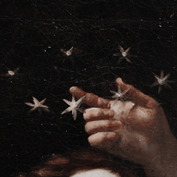


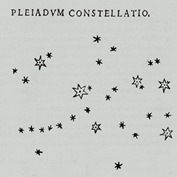
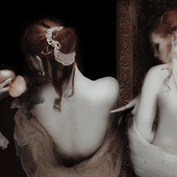



myth moodboards: the pleiades
in greek mythology, the pleiades were seven sister-nymphs, companions of artemis, the goddess of the hunt. together with their sisters, the hyades, they were called the atlantides, dodonides, or nysiades, nursemaids and teachers of the infant dionysus. the pleiades were thought to have been translated to the night sky as a cluster of stars.
requested by anon
456 notes
·
View notes
Photo

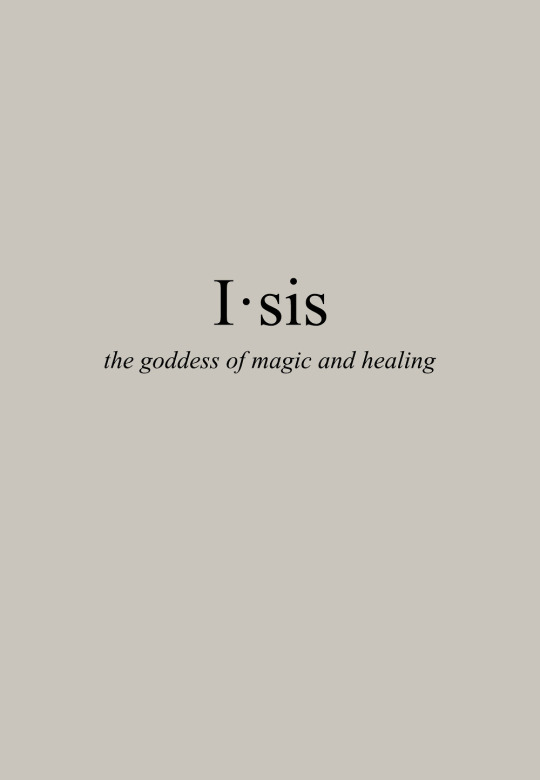

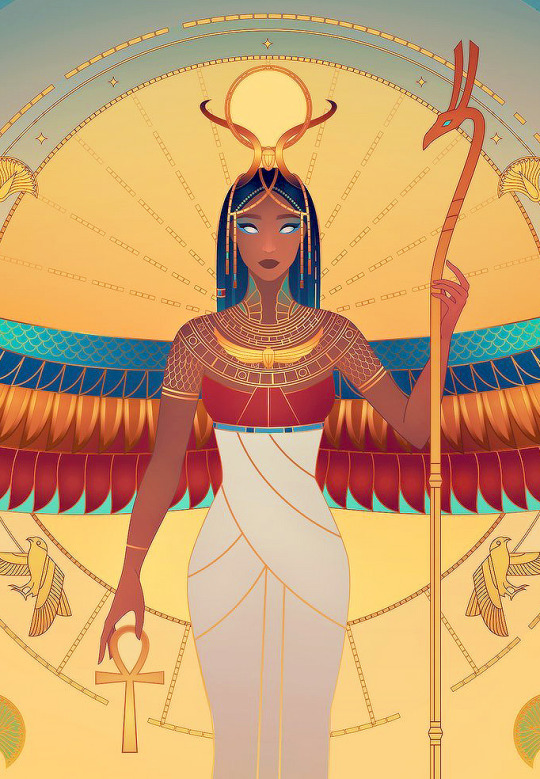
The Evermore Grimoire: Egyptian Mythology
Isis (‘Aset’ or ‘Eset’) was the goddess of magic and healing in Egyptian mythology. The most famous story of Isis began when Seth (god of war), the jealous brother of Osiris (god of the afterlife), dismembered him and scattered the parts of his body throughout Egypt. The ancient sacred stories say that the other deities were so impressed with Isis’s dedication to finding her beloved husband, that they helped her revive him. She was also very important to the ancient Egyptians because she had so many different powers. Isis was both the protector of women and the bringer of magic. Eventually she was transformed into the ‘Queen of the Universe’ and the embodiment of Cosmic Order. By the Roman period, she was believed to control the power of fate itself.
artwork by Yliade
661 notes
·
View notes
Text

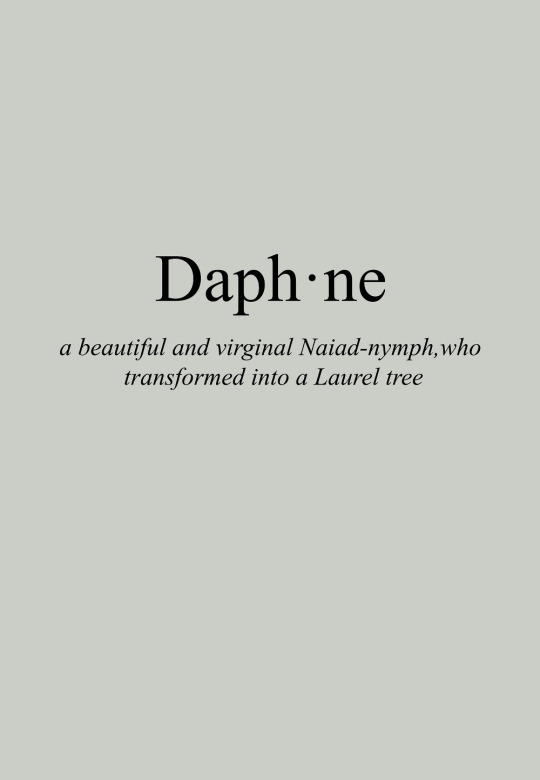

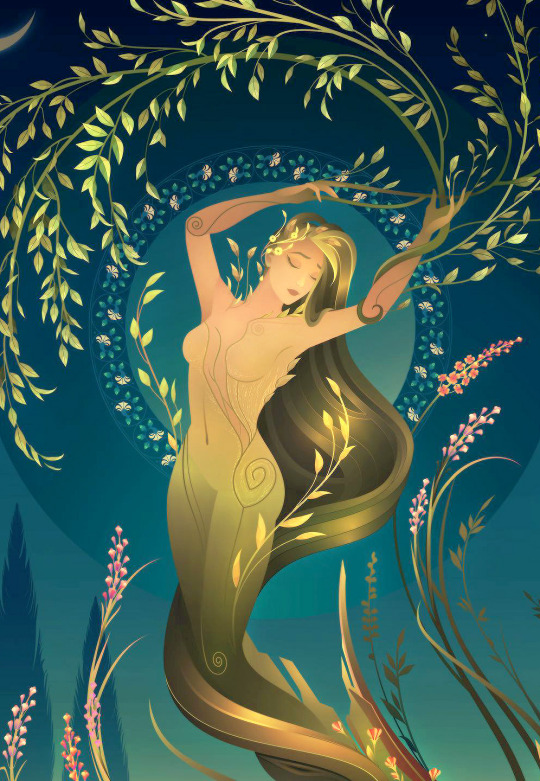
The Evermore Grimore: Greek Mythology
Daphne (Δαφνη meaning 'Laurel') was a beautiful and virginal Naiad-nymph, and usually represented as the daughter of a river god in Greek mythology. Numerous myths tell of how Daphne’s male admirers attempted to conquer her chastity. According to one myth though, her beauty caught the attention of Apollo (god of prophecy), who according to some sources had been struck by one of Eros' (god of love) love-inducing arrows, and then started chasing Daphne. She tried her best to evade him, and before she was caught, she pleaded to the goddess Gaia (goddess of earth) to save her. Daphne's pleads were heard and she was transformed into a laurel tree. Because Daphne was "loved" by Apollo, the laurel was considered sacred to him. Laurel branches were held by worshippers and priests of Apollo when honouring him, alongside the winners of the Pythian Games (athletic and artistic contests held in Delphi) were also crowned with laurel wreaths.
artwork by Yliade
427 notes
·
View notes
Text

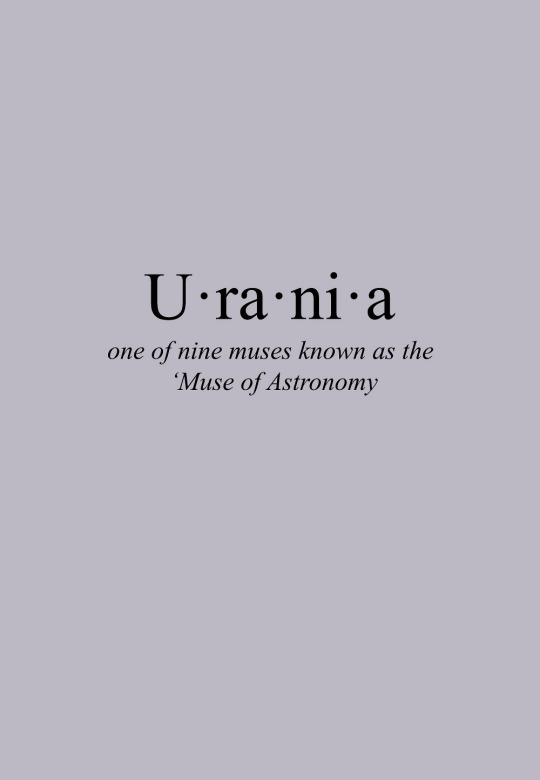

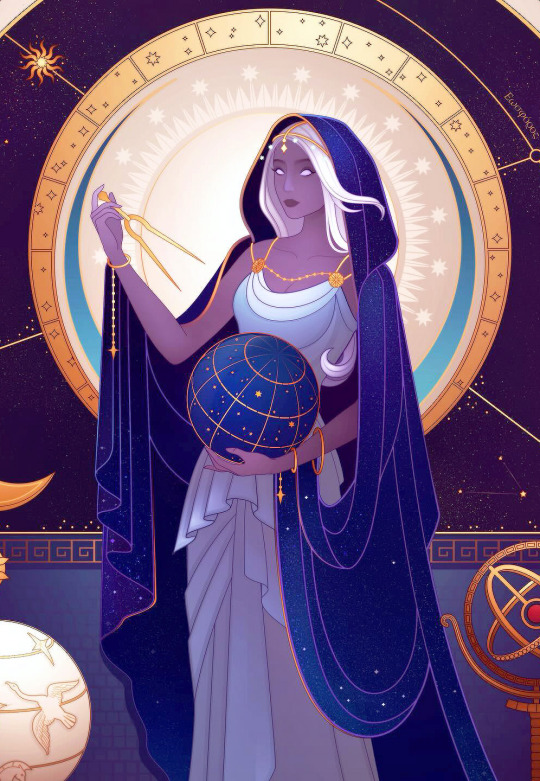
The Evermore Grimoire: Greek Mythology
Urania (Οὐρανία, Ourania; meaning ‘heavenly’ or ‘of heaven’) was one of nine muses known as the ‘Muse of Astronomy’ in Greek mythology. She was the daughter of Zeus (king of the gods) and also a great granddaughter of Uranus (god of the Sky). As such, she was often depicted holding a globe while pointing at it with her rod. She also wore a cloak that had been embroidered with the stars. One myth tells of how the constellations came to be. The gods tasked Urania with decorating the night sky to guide and inspire mortals. Using her globe and rod, she would cast patterns of stars across the heavens. Each telling a story of heroes, creatures, and gods, thus creating the constellations. She was also believed to be able to tell the future or prophesies. She did this by reading the stars as they were arranged in the sky, reading patterns and the shape of things to come. It was believed that Urania, looked upon the early humans struggling to comprehend the vastness of the night sky, so she bestowed upon them the gift of astronomy. She also taught them how to read the stars and predict the seasons, as well as how to navigate the vast oceans.
artwork by Yliade
427 notes
·
View notes
Text

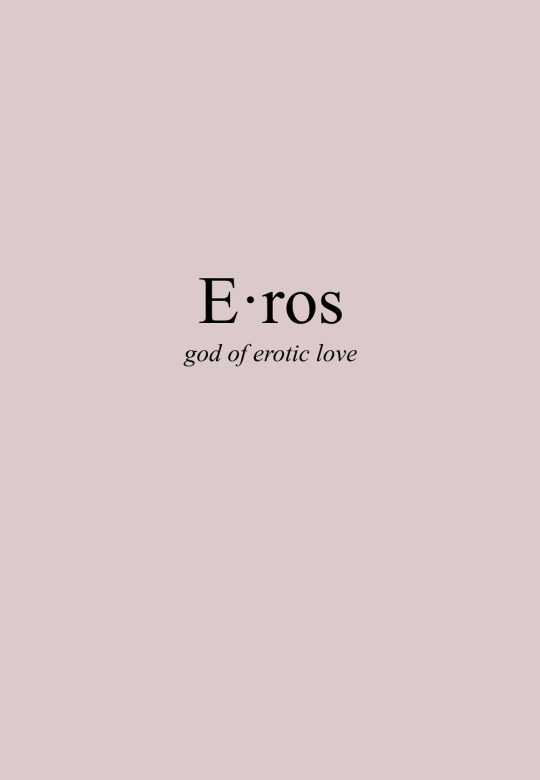

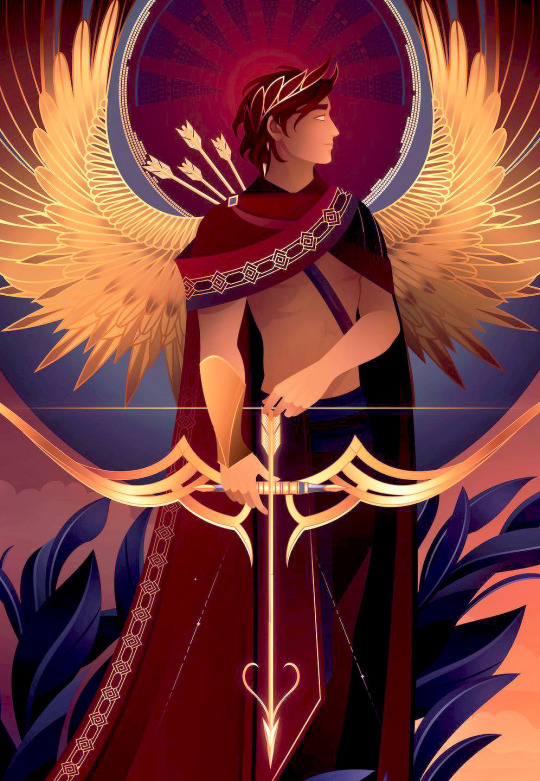
The Evermore Grimoire: Greek Mythology
Eros (Ερως) was the god of erotic love in Greek mythology. He was also a minion and constant companion of the goddess Aphrodite (goddess of love). His role in myths is mostly complementary; he often appeared in the presence of Aphrodite and the other love gods and often acted as a catalyst for people to fall in love, but had little unique mythology of his own; the most major exception to that being the myth of Eros and Psyche (goddess of the soul), the story of how he met and fell in love with his wife. Aphrodite was jealous of Psyche and her beauty, as men were leaving her altars barren to worship a mere human woman instead. So she commanded Eros, to make Psyche fall in love with the ugliest creature on earth. But instead, he fell in love with her and spirited her away to his home. Their fragile peace was soon ruined by a visit from Psyche's jealous sisters, who caused her to betray the trust of her husband. Wounded, Eros left his wife, and Psyche wandered the Earth, looking for her lost love. Eventually, she approached Aphrodite and asked for her help. Aphrodite imposed a series of difficult tasks on Psyche, which she was able to achieve by means of supernatural assistance. After successfully completing these tasks, Aphrodite relented and Psyche became immortal and lived alongside Eros. Together they had a daughter named Hedone (goddess of pleasure).
artwork by Yliade
483 notes
·
View notes

